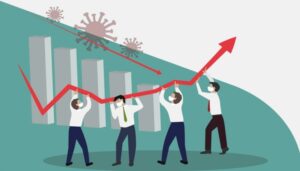The nature of work has been shaken to the very core by the COVID-19 pandemic. Although many are wishing and waiting for things to return to normal, the changes brought about by the pandemic is so drastic, it is likely things can no longer go back to the kind of normal that we once knew.
Clearly, it can be observed that almost all leaders in every part of the world have faced some moments of crisis, or are going through some moments of crisis that they have dealt with or are dealing with.

Unlike the earlier pandemics experienced over the years, the existing crisis that the COVID-19 has brought about is much different. This one seems more prolonged with different subtle phases surfacing just when it seems the numbers affected have gone down; and has become a first-hand challenge for organizations, companies and businesses all over the world. It is thus important as leaders to tune our minds to the change and start thinking about the role of their organizations, companies, businesses and leadership in a much longer term as restrictions are being loosened in parts of the world.
Responsible leadership has taken on an even deeper meaning, as our workforces and our customers find themselves in an unfamiliar, fast-moving global environment. COVID-19 has changed the way we live and work already, with far-reaching impact. Leading with compassion and caring for our workforces and communities is more essential than ever.
Virtually all companies are still determining how we change the way we work, short- and long-term. But speed is of the essence, as our workforces and communities try to function and perform, while struggling to cope with what is happening in their daily lives.

A few brief insights from Accenture workforce research spanning 15,600+ global workers in 10 countries and 15 industries highlights what workers need from leaders in three basic areas: physical, mental and relational;
- People need to trust leaders always. But especially now. Distilled to one essential message: your workforce is looking to trust you. And it will trust if it believes leadership cares for each individual, the community, and humanity as a whole.
- Beyond caring, leaders must show they have a plan. You don’t have to know everything, but you do need to be transparent about what is driving decisions. A leadership team that looks ahead proactively, and responds rather than reacts, goes a long way toward helping people in volatile times.
- The ability for leaders to address people’s physical, mental and relationship needs is the foundation of trust. While all of these needs have equal importance, there is an order in which they make the biggest difference – Accenture.
As we work on the different ways of making leadership more relevant to our organizations, companies and businesses, here are 4 elaborate points from controlrisks to help leadership in this COVID-19 era:
- LEAD BY EXAMPLE: AVOID BURNOUT
During this pandemic, it can be tempting to think that, as a leader and manager, you always need to be front and center. Being the first person online in the morning and the last to sign off may demonstrate that you are energetic and committed…yet at what cost? You also want to be accessible, patient and level-headed, qualities that can run low when you are physically, mentally and emotionally depleted.
If your workforce observes this decline (and they will!), they may come to believe that all employees must similarly push themselves to the brink of exhaustion. Of course, during extraordinary times we operate at an enhanced level and there are increased expectations around availability. Yet during a prolonged crisis such as the COVID-19 pandemic, organizational leadership must adapt to a modified level of operations – one that maximizes output without fostering burnout.
Leaders, therefore, need to model good self-care and demonstrate the importance of rest and recovery to the workforce. When you step away from work, truly step away. Appoint someone you trust to assume the leadership role and take a break from your e-mails. Instruct your back-up to call you only in a true crisis and be clear that you will not be looking at emails during time off. Be disciplined in this and others in the organization will get the message that rest is a priority.
Similarly, respect the down time of others. Do you absolutely have to send an email out at 10:30pm or can the non-urgent, administrative issue wait until normal operating hours? Your actions set the tone during a crisis. Finally, lean on other leaders and seek out assistance from each other, especially when identifying all available mental health and financial resources. Everyone in this global crisis is impacted in some way. Recognize that you and your employees all have physical and emotional limits. Demonstrate the importance of rest.
2. EMPOWER ALTERNATES
It is tempting during a crisis to become the decisive executive who boldly pulls the organization forward through the storm to safety (“I alone can solve this…”). Yet, even executive managers must eventually rely upon secondary leaders, a middle-management “deep bench” that becomes even more essential during sustained crisis management.
While CEOs can and should remain the key voice setting the tone for the organization, an alternating schedule can adjust expectations for the long term. Extended crisis events like that brought about by COVID-19 are best served by decision-making processes that are consultative, rather than unilateral, in style.
When the CEO or an executive must attend to other matters (including sick leave) without advanced warning, this can naturally promote anxiety and concern in the workforce. By routinely calling upon backup or secondary leaders before it becomes a critical need, executives protect the organization from future panic and demonstrate organizational fortitude should the coronavirus impact the C-suite.
Importantly, routine incorporation of secondary leaders in day-to-day operations buys time for executives to recover from fatigue, while providing critical opportunities for reflection and the creation of long-term solutions.
Make the deliberate decision to involve secondary leaders and middle managers to a greater degree than you would during normal operations. Recall that the old adage “people tend to support what they help to create” applies in a particularly meaningful way during a severe crisis, where employees are looking for ways to make meaningful contributions for the collective survival of the organization. Ensure that trusted alternates are informed and empowered to make decisions.
3. BE CONSCIOUS OF STRAINING YOUR CRISIS MANAGEMENT TEAM
At the beginning of a crisis, it is normal to adopt an “all hands on deck” approach. It is also typical to overburden your “go-to” team members, the high-performers who push themselves to the point where stress and fatigue compromise their decision-making. Adaptive capacity in this context means the dispersion of tasks and the preservation of energy.
For instance, dividing a medium or large crisis management team (CMT) into two or more teams will allow for shift work and will sustain effectiveness over a prolonged crisis event. Make sure that your high-performers aren’t overused or drained to the point of exhaustion. They may resist taking down time and may need to be directed to rest.
Given the enormity and scope of a pandemic, consider that some CMT members are now being pulled in new and unforeseen directions. It’s safe to say that most CMTs have not prepared for a pandemic of this proportion and impact. Your teams likely feel inadequately prepared or trained, increasing the likelihood of compromised team confidence. In addition, many CMT members will be placed in a position where they are providing both technical and emotional support to co-workers and clients, a multi-directional drain that can quickly squeeze even the most resilient of teams.
Empowering teams through training opportunities and eliminating non-essential administrative tasks may preserve mental and emotional bandwidth. Plan for the long game. Create multiple teams and avoid overburdening the same employees.
4. BE OPEN TO SHARING YOUR PERSONAL EXPERIENCE
Crisis leaders must recognize that this is an unprecedented moment in the lives of their employees and in their own lives. While containing your own feelings and emotions can be important in leading your organization through a crisis, the suppression of these feelings can actually harm your effectiveness as a leader. As employees struggle with fear, anxiety and uncertainty, they may wonder if management experiences the same challenges, particularly in light of different compensation levels.
It would frankly be odd for a leader in such abnormal circumstances to behave as if things remain “business as usual.” You may not typically be expressive in talking about your personal life with your employees, but adaptive capacity in this area calls for empathy towards those employees who are uncertain and anxious. Do not be afraid to show how you have been personally affected by this crisis and the emotional impact it has had on you.
Balance is also key when it comes to communications and interactions between leadership and employees.
Every day provides reminders that a crisis is underway, and many internal communications only serve to reinforce that. Capitalize on opportunities for more positive interactions that will help your workforce to feel connected, particularly if you are working remotely. Share in some of the frustrations of social distancing and moments of levity, such as when the dog decides to bark during a Skype or Zoom call. In doing so, you are showing that in these extraordinary times we are all members of a community doing our collective best to navigate uncharted waters. Demonstrate emotional intelligence. Sharing emotions and personal impact stories with the workforce creates an environment of empathy and resilience.
Your energy, focus and resilience become precious commodities during a prolonged state of crisis. The same goes for your employees. Embracing adaptive capacity in functional, pragmatic strategies should be complemented by your own personal steps for self-care, and can set you, your organization and its people up for long-term resilience in the face of COVID-19.
Are you ready for TRANSFORMATION?
Dzigbordi K. Dosoo: The H.E.L.P. Coach
Dzigbordi K. Dosoo is a Soft Skills Expert, Personal Impact, Professional Growth and Influence Expert specializing in Humanness, Entrepreneurship, Leadership and Power – H.E.L.P.
A career spanning over two decades, she has established herself as a Certified High Performance Coach, Speaker, Author, Wellness Expert and award-winning Entrepreneur with a clientele ranging from C-Suite Executives, Senior Management, Practitioners and Sales Leaders spanning 3 continents.
She is the Soft Skills Expert and Founder of Dzigbordi K. Dosoo (DKD) Holdings; a premier lifestyle business group with brand subsidiaries that include Dzigbordi Consulting Group& Allure Africa.
Dzigbordi has been featured on CNN for her entrepreneurial expertise. She is one of the most decorated female entrepreneurs in Ghana having being named “CIMG Marketing Woman of the Year” in 2009; “Top 10 most respected CEOs in Ghana, 2012; Global Heart of Leadership Award and, Women Rising “100 Most Influential Ghanaian Women”, 2017.
She can be reached on [email protected] and @dzigbordikwaku across all social media platforms.










